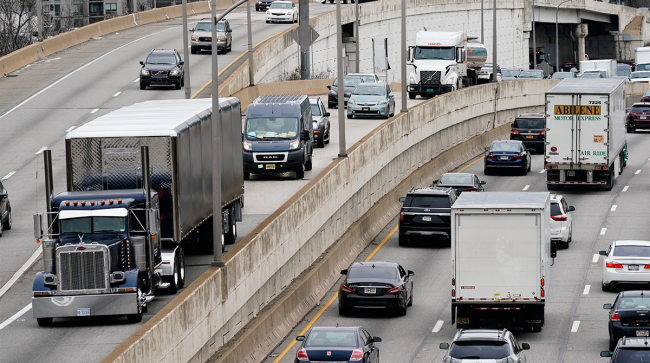(Matt Rourke/AP)
WASHINGTON — Committees in the Republican-led Senate recently took aim at commercial transportation and emissions policies as they seek to finalize their response to the House-passed procedural budget package before the July Fourth recess.
The leadership on the transportation panels proposed measures this month targeting infrastructure programs, emissions regulations and emerging transportation technologies. The aim, senior senators explained, is to clear for the White House by next month a comprehensive budget legislation reflecting much of President Donald Trump’s domestic agenda.
For the chamber’s consideration, the Environment and Public Works Committee on highway policy proposed further streamlining environmental permitting review processes as well as minimizing programs similar to progressive Democrats’ Green New Deal vision.
Specifically, the EPW panel is calling for creating an opt-in fee system at the Council on Environmental Quality designed to expedite environmental reviews. The committee’s measure also would undo Biden-era emissions standards meant to expand access for electric vehicles.
With the passage of @SenMullin’s CRA that would reject overly stringent requirements on diesel engines, elevating the cost of shipping goods, the Senate has now passed all three resolutions under @SenCapito’s effort to end the EV Mandate. https://t.co/sq1w8NHvw8
— EPW Republicans (@EPWGOP) May 22, 2025
“This legislative text puts in motion plans that Senate Republicans pledged to take, like stopping Democrats’ natural gas tax and rescinding unobligated dollars from the so-called Inflation Reduction Act. I look forward to working with my colleagues to move our legislative package forward to enact President Trump’s agenda, which the American people overwhelmingly support,” EPW Chairwoman Shelley Moore Capito (R-W.Va.) said this month.
The Commerce Committee on freight policy also unveiled its portion of the procedural budget bill. Atop its priorities is to minimize funds for severe weather resilient projects as well as emissions reduction programs. A provision would enhance funding for air traffic control communications and infrastructure. Ultimately, the Commerce panel’s portion of the budget bill “brings down automobile prices modestly by eliminating [corporate average fuel economy] penalties on automakers that design cars to conform to the wishes of [Washington] bureaucrats rather than consumers.”
Commerce Committee Chairman Ted Cruz (R-Texas) explained: “Senate Republicans are fixing the aging air traffic control system, rebuilding the Coast Guard to secure our maritime border against deadly drugs and illegal immigration, ensuring the U.S. — not China — gets to Mars and gets back to the moon first, and turbocharging economic activity with expanded commercial access to spectrum.”
Trump and Republicans’ big, beautiful bill (for billionaires) is the result of fossil fuel corruption run amok.
The cost to American families will be extremely, extremely grave. pic.twitter.com/oalConDX8d
— Senate EPW Democrats (@EPWCmte) June 11, 2025
“These provisions,” Cruz added, “fulfill the mandate given to President Trump and congressional Republicans by the voters to unleash America’s full economic potential and keep her safe from enemies.”
Front and center in the House and Senate versions are extending the Trump-era 2017 tax cuts. Also, both versions seek to bolster border security, military readiness, domestic energy initiatives and supply chain connectivity. Not included in the Senate version are new fees for electric and hybrid vehicle drivers. Such fees are included in the House-passed measure.
Congressional leaders are aiming to wrap up the procedural reconciliation bill by the July Fourth recess. The measure’s final version would need approval in each chamber. As part of the reconciliation budget process, a simple majority is required for passage.
Democrats remain united in their opposition to the Republican-led budget package. On June 11, Senate Minority Leader Chuck Schumer (D-N.Y.) argued, “If Republicans proceed with the bill, they will put Americans out of work in their own states. And the American people, and these workers in particular, are starting to see it.”
Sen. Sheldon Whitehouse (D-R.I.), EPW’s ranking member, agreed with Schumer’s pushback. As he put it, “This bill is every bit the betrayal of American families we knew it would be. Rescinding the methane emissions fee and gutting auto emissions standards will raise energy prices, worsen air quality and turbocharge climate change. Senate Republicans have made clear that their favored constituency is their fossil fuel industry donors.”






